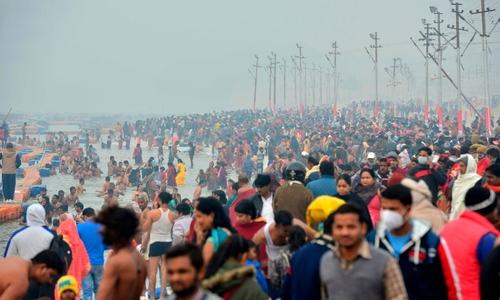India's Modi kicks off 'world's largest' vaccination campaign


Indian Prime Minister Narendra Modi launched on Saturday one of the world's largest vaccination campaigns, as part of efforts by the populous nation to bring the Covid-19 pandemic under control starting with two locally-manufactured shots.
Modi, who addressed healthcare workers through video conferencing, will not immediately take the vaccine himself as India is initially prioritising nurses, doctors and others on the front line.
“This will be the world’s largest vaccination programme covering the entire length and breadth of the country,” Modi’s office said in a statement this week.
Indian authorities hope to give shots to 300 million people, roughly the population of the United States and several times more than its existing programme that targets 26m infants.
The recipients include 30m doctors, nurses and other front-line workers to be followed by 270m others, who are either aged over 50 or have illnesses that make them vulnerable to Covid-19.
Health officials haven't specified what percentage of the nearly 1.4 billion people will be targeted by the campaign. But experts say it will almost certainly be the largest such drive globally.
The sheer scale has its obstacles. For instance, India plans to rely heavily on a digital platform to track the shipment and delivery of vaccines. But public health experts point out that the internet remains patchy in large parts of the country, and some remote villages are entirely unconnected.
India gave the nod for emergency use of two vaccines, one developed by Oxford University and UK-based drugmaker AstraZeneca, and another by Indian company Bharat Biotech, on Jan 4. Cargo planes flew 16.5m shots to different Indian cities last week.
Health experts worry that the regulatory shortcut taken to approve the Bharat Biotech vaccine – without waiting for concrete data that would show its efficacy in preventing illness from the coronavirus – could amplify vaccine hesitancy. At least one state health minister has opposed its use.
India's Health Ministry has bristled at the criticism and says the vaccines are safe, but maintains that health workers will have no choice in deciding which vaccine they would get themselves.
According to Dr S P Kalantri, the director of a rural hospital in Maharashtra, India's worst-hit state, such an approach was worrying because he said the regulatory approval was hasty and not backed by science.
"In a hurry to be populist, the government (is) taking decisions that might not be in the best interest of the common man," Kalantri said.
Against the backdrop of the rising global Covid-19 death toll, which topped two million on Friday, the clock is ticking to vaccinate as many people as possible. But the campaign has been uneven.
In wealthy countries, including the United States, Britain, Israel, Canada and Germany, millions of citizens have already been given some measure of protection with at least one dose of vaccine, developed with revolutionary speed and quickly authorised for use.
But elsewhere, immunisation drives have barely gotten off the ground.
Many experts are predicting another year of loss and hardship in places like Iran, India, Mexico and Brazil, which together account for about a quarter of the world's deaths.
India is second to the US with 10.5m confirmed cases, and ranks third in the number of deaths, behind the US and Brazil, with almost 152,000.
Over 35m doses of various Covid-19 vaccines have been administered around the world, according to the University of Oxford.
While the majority of the Covid-19 vaccine doses have already been snapped up by wealthy countries, Covax, a UN-backed project to supply shots to developing parts of the world, has found itself short of vaccine, money and logistical help.
As a result, the World Health Organisation's chief scientist warned, it is highly unlikely that herd immunity, which would require at least 70 per cent of the globe to be vaccinated, will be achieved this year.
As the disaster has demonstrated, it is not enough to snuff out the virus in a few places.
Even if it happens in a couple of pockets, in a few countries, it's not going to protect people across the world, Dr Soumya Swaminathan said this week.














































